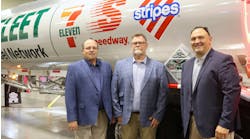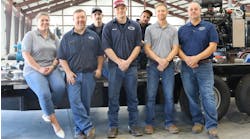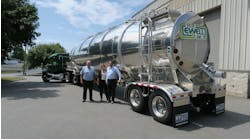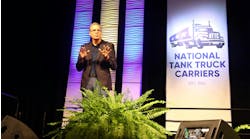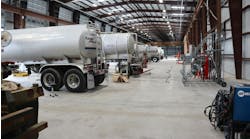A lot of people dream of ditching their boss and going to work for themselves.
Tara Heaney-Moore’s father actually did it.
And though the decision was rash, it was based on a deep understanding of the marketplace, and a unique vision—to provide the most advanced and comprehensive bulk transportation services available in North America.
Nearly 50 years later, Tom Heaney’s ‘crazy’ idea has grown into CBSL Transportation Services, the largest full-service bulk transportation operation in the United States, with three full-service locations—and more coming soon—that provide transportation for tank trailers, ISO tank containers and intermediate bulk containers (IBCs); tank cleaning; tank repair and depot services; and tank sales and leasing, all in a one-stop, bulk liquid shop.
“One day he got mad, so he went in and quit,” said Moore, who’s now majority owner and vice president of CBSL. “He had no plan. He came home and told my mom he’d quit, and he was going to start his own company, and she thought he was crazy. She was like, ‘What are you talking about? You have four kids and a mortgage.’
“But that’s what he did. So he started CBSL in 1972.”
What today is an operation that boasts nearly 500 employees, including roughly 225 drivers, and sprawling grounds in Chicago, Illinois; Pasadena, Texas; and Reserve, Louisiana, started as Chicago Bulk Sales & Leasing, a small bulk transportation equipment business based out of a friend’s shop in Summit, Illinois.
But like its name, the company has continued to evolve.
Heaney initially focused on tank trailers, quickly moved into container logistics—at a time when ISO tanks still were a novel concept in the U.S.—and then decided CBSL should design and install its own tank wash facilities. It opened its first wash rack in 1980, expanded into Texas in 1992, and added a third wash facility in Louisiana in 2003.
Now the do-all provider has added a new service in Chicago—foodgrade tank cleaning.
CBSL opened its first foodgrade wash rack in November 2019, after several years of planning, implementation and testing, and—true to its founder’s innovative spirit—custom-designed a full-service system capable of cleaning the foodgrade ISO tanks customers increasingly are pleading with them to service.
“Dad always thought we should be innovators, and that spark is still in all of us,” Moore said. “We want to be leaders in our industry. Whatever area we’re in, we are going to be progressive. And we’ve always been technology-driven, which helps with efficiency, safety and everything else. So that’s a big part of our philosophy.”
Streamlined operation
Heaney’s transportation background set the company’s foundation.
He worked for a railroad company early on in his career, fueling his interest in intermodal transportation, then he spent time with the logistics divisions of Shell Chemical and Abbott Laboratories, giving him insight into the transportation activities of chemical manufacturers who need to move bulk liquids.
When Heaney decided to start his own company, a well-known friend in transportation—Elton “Buzz’ Babbitt—lent a hand.
Babbitt, who created Montgomery Tank Lines in 1965, allowed Heaney to set up shop inside his Chicago-area location. Heaney went to work buying and selling new and used equipment—he was a dealer for Brenner at the time—leasing trailers and providing trucking. Montgomery, of course, later merged with Chemical Leaman Tank Lines to form what today is Quality Distribution, the parent company of Quality Carriers.
Chicago Bulk quickly outgrew the space, so Heaney moved to a 6-acre site off Interstate 55, near Chicago Midway International Airport, that remains CBSL’s headquarters today. And the company continued to flourish in the 1970s due to Heaney’s willingness to handle ISO tank containers. A native of Ireland, he already was familiar with the containers, which grew in utilization in Europe after World War II, so he was receptive to developing ways to handle and clean ISO tanks when approached by Sea Container.
CBSL’s transportation division now specializes in moving bulk liquid products in all types of tanks, including flexitanks, and between all modes of transportation. The company’s domestic fleet includes more than 750 units, split between ISO tanks, tank trailers and chassis trailers, operated by a mix of company and owner-operator drivers.
And that’s only one measure of the operation’s sweeping scope.
At CBSL, “full-service” doesn’t mean vendors are on call. Everything, from washes to shop work, and even technology development—CBSL boasts its own IT department—is handled in-house. “People have moved away from owning those services, while CBSL said ‘Nope, we’re going to continue managing the quality of our services, and meeting our own expectations,’” said Azalia Tennis, director of North American business development.
As part of its depot services, CBSL manages and stores empty and loaded tank containers at all three sites. Moore said the Pasadena yard alone can house “several thousand” containers for its wide range of customers, who include chemical manufacturers, oil producers and foodgrade clients; along with non-vessel operating carriers (NVOCs), freight forwarders and domestic bulk tank carriers. “We can provide the same services for every piece of equipment, as far as testing, repair and refurbishment, and cleaning,” Moore said.
Juan Almaguer, CBSL’s director of tank cleaning and IBC operations, estimated the Houston-area location, which is the company’s largest, cleaned more than 18,000 pieces of equipment last year, a prolific throughput followed closely by Reserve (13,000 units) and Chicago (10,000), which handles the most IBCs.
“A lot of our competitors may have a tank cleaning facility only, or a repair facility, or only provide trucking. We do it all,” said Jeff Moore, co-owner and president of CBSL. “That’s even more important these days with the cost of moving freight and driver shortages, and the difficulty of shuttling equipment between multiple companies.
“So our concept from Day 1 has been, by doing it all in house, we can provide a more streamlined service to our customers, and reduce their overall costs and headaches. They can make one call to get everything done, turned and ready to load again.”
Essential service
CBSL grows alongside its customers by responding to market conditions.
In his 27 years with the company, Jeff Moore has seen many dips and rises in demand for different modes of transportation. In 2020, restrictions that countries implemented to try to slow the spread of COVID-19 made importing product more difficult. At the same time, U.S. rail shippers faced with soaring rates for ISO tank cargoes started to turn to trucks. So CBSL added a mix of 85 tank containers and trailers to its fleet last year, both to help manufacturers meet the need for more domestic product sourcing, and for product transport.
CBSL also adjusts to shifts in product demand. Last year, the company moved more “essentials,” like liquids for building materials, or alcohol for sanitization. And over the last several years it has serviced a growing number of ISO tanks filled with myriad foodgrade liquids, from the rapeseed oil in Vitamin E supplements, and pharmaceuticals used to make pill capsules, to more recognizable liquids like chocolate and juice.
Tara Moore said their foodgrade ISO tank business has grown by 10% annually the last several years. “Anybody who services that industry has been adding equipment,” she said. “All of our customers have been buying tanks, and adding thousands of tanks, just because they don’t have enough.” And the increase in foodgrade tank containers sparked a need for better, and more efficient, foodgrade tank cleaning.
In the Chicago area, that need was great. “We were getting calls every week from customers who wanted to know when we were going to be ready,” Tara Moore explained. CBSL previously handled foodgrade containers, but outsourced their cleaning. And most of the foodgrade wash racks in the area were tied to another bulk carrier, leaving limited independent options, especially when it came to cleaning ISO tanks.
“For an NVOC or food company doing ISO tanks, you had to send your ISO tanks to a foodgrade carrier who predominantly handles tank trailers, and they’re really not set up for it,” Jeff Moore said. “The rack heights are wrong, because a chassis with an ISO on it sits much higher than a tank trailer. They just weren’t set up in the Chicago market for ISO tank foodgrade cleaning, so there was absolutely a need.
“That’s what really pushed us into it.”
Grade-A cleaning
The decision came with a caveat—if we’re going to do it, let’s do it right.
In his pursuit of a better tank wash, Heaney, who retired in 2006, traveled overseas to study “cutting-edge” international technology. CBSL bought its first system from German manufacturer Weidner—it was shipped over in 20-foot containers, and assembled on site by Heaney and his team, who learned as they went—because he was sold on the European style of high-pressure, low-volume cleaning using non-recirculated fresh water.
So the Moores—a husband-wife team that works—knew they had to establish a new standard for foodgrade ISO tank cleaning, while maintaining CBSL’s tried-and-true approach, which translates well to cleaning food out of containers. By using fresh water every time, the single-pass system reduces the potential for contamination.
“That’s our technology and we’ve stuck with it, so all of our washes we’ve done since then have the same concept,” Tara Moore said. “It’s higher pressure and lower volume, as far as soaps, detergents and water, and it’s worked for us.”
Company leaders began discussing a foodgrade wash rack back in 2017. Once the decision to move forward was made, the project came together quickly, with everything from conception to construction completed in less than a year. The job included converting a shop bay on an area of the Chicago property that is separate from the location’s four chemical-cleaning racks into the new foodgrade bay, so that all of its plumbing, piping and storage is completely isolated, further discouraging cross-contamination.
Then the cleaning staff began conducting trial runs, while collaborating with customers to develop processes that meet their requirements, and working to obtain key certifications. The foodgrade wash facility is a fully U.S. Food and Drug Administration (FDA)-approved Hazard Analysis Critical Control Point (HACCP), with an established management system for the safe handling of all food products, including dairy, juice and seafood.
“You have to have a process and a procedure for everything you do, from checking the temperatures of the vats, and having a second contact point to verify the temperature gauges are working, to making sure your spinners are spinning,” Almaguer said. “You have to listen to them. And all of those procedures are documented on a daily, weekly and monthly basis.”
HACCP restrictions govern everything from construction materials—foodgrade equipment must be stainless steel—to the soap technicians use to wash their hands, their gloves, and even their clothes. “The bay is heavily restricted,” Tara Moore said. “It’s locked off, and only certain people have codes to get into that area. We keep it completely separate so somebody can’t inadvertently wander in. It’s a sterile environment.”
The facility also is certified for Kosher and Halal cleans, and follows Juice Product Association (JPA) guidelines for the handling of all foodgrade products. “Our cleaning standards meet all JPA protocols,” Almaguer maintained. “That’s how we decided to implement our entire program. It’s based on stringent JPA principles.”
Quality-controlled
CBSL wash racks all are non-recirculating. As Tara Moore points out, “Do you want to take a bath in somebody else’s bath water?”
They’re also high pressure, low volume. High pressures are achieved utilizing specialized spinners designed to maximize impingement. CBSL equips Groninger spreaders and spinners for chemical cleans, and Gamajet spinners that provide 360-degree coverage at 500 pounds per square inch (psi) for foodgrade. And the systems are low volume because they don’t rely on flooding tanks with water to clean them.
Per JPA standards, many foodgrade cleans are done without detergent, so there are fewer “wash recipes” to maintain than with chemical cleaning facilities. Ethanols, for instance, require only water heated to 190 degrees F with steam coils before the process begins. Vegetable oils are removed with FDA-approved, high-PH detergents injected into the water. Fatty acids, like chocolates, sometimes require two washes, with a pause in between for scraping out stubborn residue. Foodgrade heel is captured and stored in drums.
CBSL also uses steam to heat loaded foodgrade tanks for transport.
“It’s all customer driven,” Almaguer said. “The customer decides what they want done.
“It’s their product, and they’re the ones who are going to load the tank, so if they want it washed a certain way, that’s how we do it.”
Dropdeck trailers enable CBSL to load two tanks into the bay at once, so the second tank is ready to clean as soon as the first one is completed. Rinses are performed with lower-volume Grundfos pumps, and ambient-temperature blowers with MERV 13 air filters changed at least once a month ensure rapid dry times.
Typical alcohol cleans take only 25 to 30 minutes, Almaguer estimated.
A dedicated foodgrade staff includes three highly trained, full-time employees on two shifts, though Almaguer said they hoped to add a third shift soon. Cleaners are required to wear full Tyvek protective suits, including hard hats and face shields; and wear full-body safety harnesses when they’re working on top of tanks.
Their goal is to ensure every tank is “clean, dry and odor-free.” Customers demand it, and company leaders expect to deliver it. And by controlling every step in the process, from transportation to cleaning and storage, CBSL can eliminate potential “weak links” and avoid finger-pointing if something goes wrong—which it rarely does. “Our rejection rate is less than 1%,” Tara Moore said. “We’re about 99.4% on acceptance.
“I don’t know anybody else who can say that.”
Road ahead
With so many satisfied customers, CBSL continues to gain market share.
Business is booming, Tara Moore said, and they can’t hire drivers fast enough. Upticks in service requests are coming from all segments, Tennis added, including overwhelmed third-party logistics firms. But they remain open to new customers, products and cleans, large and small. “We’re here, and we can do it all, so we can tweak a process, refine it, offer it as a service, and then grow that particular customer base,” Tennis said.
To meet demand, CBSL plans to open two full-service facilities in new markets this year. One was scheduled to open last year, but delayed by the pandemic. Two new satellite operations, which would join a satellite terminal in Iowa, also are in the works. “Customers continue to ask us to move into new markets,” Tara Moore said.
The key, Tennis emphasized, is to look for long-term partnerships, and avoid temporary, self-serving arrangements that dissolve as markets “right size.” “We’re in a position today where it’s important for us to understand what our customer base has been, and protect that,” she insisted. “Because while I could go sell business for three times what I’m getting now, it’s important not to chase the dollar, and instead shore up key relationships and partnerships, and pick the customers who we want to do business with.”
Jeff Moore said he expects 2021 to be a good year for savvy companies in the bulk transportation industry. CBSL surprisingly cleaned as many foodgrade tank trailers as ISO tanks last year, due to an unusual environment exacerbated by the pandemic, but he anticipates more tank container cleans going forward.
The pandemic also forced CBSL to reimagine how employees operate. While some worked from home, others came in on staggered shifts to minimize risk. Communication improved along the way, and the company actually enjoyed productivity gains in some cases, so leaders plan to continue refining organizational structures.
CBSL also is continually bolstering its technology. It has long offered GPS asset tracking. Now it’s enhanced through FourKites’ real-time, supply chain visibility platform. Drivers are equipped with tablets for inspections and routing, and soon will have access to optical character recognition (OCR) software that allows them to digitally convert an image of a tank container identifier into machine-readable data.
Tara Moore said they also plan to have Samsara camera systems in every truck by April.
“For a lot of us, 2020 gave us time to think about where we’re going in 2021,” Jeff Moore said. “So organization, and zeroing in on efficiencies and service, is key, as is working with the right partners. Our focus is on identifying and developing longer-term partnerships with chemical companies, NVOCs and carriers alike.”
